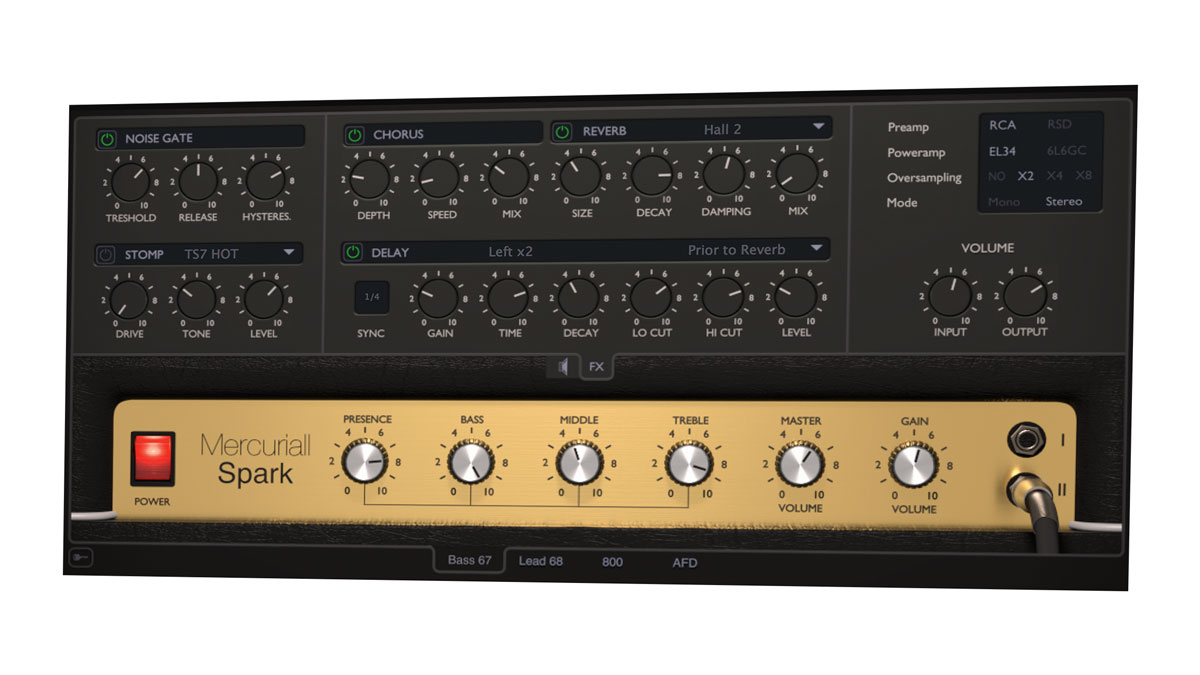MusicRadar Verdict
Spark steers clear of complex rigs to deliver top notch Marshall amp tones with some excellent supporting pedals and effects.
Pros
- +
Four distinct Marshall emulations. Solid upfront sound . Realistic gain interaction. Tweakable cabinet tones.
Cons
- -
Limited choice of pedals. No twin rig option.
MusicRadar's got your back
Spark (AU, VST, AAX) is a new amp simulation from Russian developers Mercuriall.
Building on its previous emulations such as Tube Amp Ultra 530, it combines amp and cabinet components with a single Stomp pedal slot (with four options), three simultaneous effects (Chorus, Reverb and Delay) and an input Noise Gate.
The amps emulated are all Marshall, with a JMP Super Bass (Bass 67), JMP Super Lead (Lead 68), JCM800 (800), and AFD100 Slash Signature (AFD). In each case you get low and high-level inputs (I and II), Master level, Gain and four tone controls (Presence, Bass, Middle and Treble). Much like the amps, AFD also includes a toggle switch (#34) for the JCM800 mod.
For each amp, there's a choice of preamp valves and power amp valves, and you get four 4x12 cabinet options featuring modern Celestions (G12T-75, V30 and G12M) and vintage JBLs (K120). Spark includes three mic emulations (SM57, Sennheiser MD441 and Royer R121), two of which can be used simultaneously.
Further global options are oversampling, global Input and Output levels, and Mono/Stereo mode. The Stereo setting simply allows you to process a stereo input in stereo. Importantly, Spark doesn't provide twin rigs.
Artificial neural networks
Mercuriall is a collaboration between software programmer Vladimir Titov and audio engineer Vjacheslav Tikhonov. Its key focus is designing highly realistic guitar amp simulations.
In this quest, it took the decision to avoid traditional waveshaping or tone-matching systems, instead pursuing hardware component modelling. The downside of trying to achieve this in real-time is the big CPU hit, so they turned to a technique called artificial neural networks (ANN). This allows them to 'learn' a particular input/output behaviour, and once the 'training' process is complete, algorithms can be used to deliver a more CPU-efficient but still accurate plugin.
Focus
Spark's core amp sims sound fantastic, delivering upfront, direct and punchy tones. What's more, the Input (I or II), Gain and Master settings feel very much interrelated, with overdrive available from both the Gain and Master controls. This is precisely how a Marshall behaves, achieving a very broad sound palette ranging from clean and bright to harsh saturated distortion.
Each of the amps still has it's own flavour. The Bass 67 and Lead 68 deliver similar-sounding saturation at high gain and chunky crunch at lower levels, but their EQs are different, with the Lead 68 more edgy, particularly on input I.
The 800 offers even more saturation and with the Treble and Presence up high produces some lovely chiming harmonics. The AFD, meanwhile, delivers the most distorted sound, though has a slightly smoother EQ curve than the 800. Switch it to #34 mode and the overall sound is quite bright and thin.
Spark's speaker options deliver tones ranging from scooped (K120) to midrange dominant (G12M). The mic adjustments deliver quite dramatic differences, particularly up close (much like in the real world), moving from a bright fizzy tone on the cone Cap to a thicker, darker tone at the Edge. Each mic's pickup pattern is revealed as its position is changed.
Spark's Stomp pedals are based on three Ibanez Tube Screamers (TS808, TS808 Mod and TS7) and one Mesa/Boogie pedal (the Grid Slammer). Each successfully delivers its own variant on pedal distortion, and works best with clean or crunchy rather than full-gain settings. Finally, although Spark can't create stereo rigs, the onboard effects are great for a bit of extra depth and width.
Spark is a well-executed plugin that prioritises faithful amp tones over complex routing and endless choice. It also delivers some of the finest emulated Marshall tones we've heard.
Computer Music magazine is the world’s best selling publication dedicated solely to making great music with your Mac or PC computer. Each issue it brings its lucky readers the best in cutting-edge tutorials, need-to-know, expert software reviews and even all the tools you actually need to make great music today, courtesy of our legendary CM Plugin Suite.
“We were arguing a lot and we were miserable”: How Green Day exceeded expectations with their most ambitious song
"There’s plenty for us guitarists to learn – and ‘less is more’ is the overriding lesson": how to play like George Harrison on The Beatles' Abbey Road
“They didn’t like Prince’s bikini underwear”: Prince’s support sets for the The Rolling Stones in 1981 are remembered as disastrous, but guitarist Dez Dickerson says that the the crowd reaction wasn’t as bad as people think











